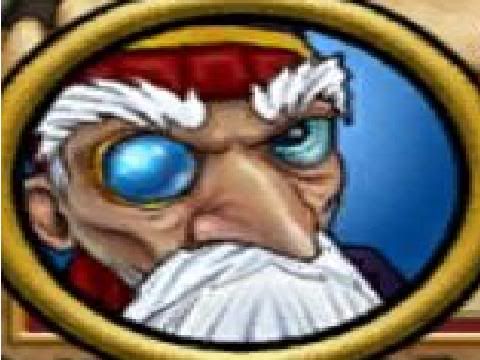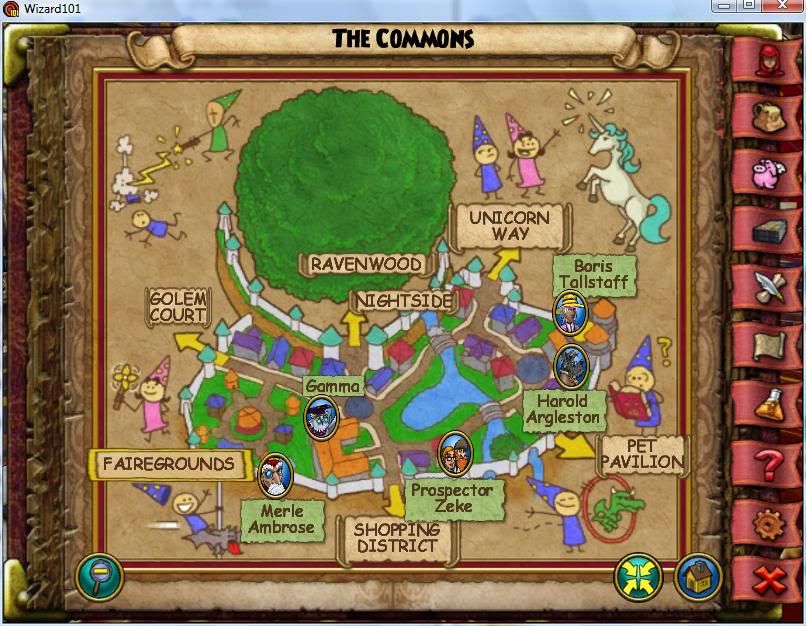At least part of Geoffrey of Monmouth's earlier writings matches up with reasonable soundness where events are concerned... so we are left again with his assertion that a man named Merlin prophesied these events ahead of time...
Alight, I know I know you're thinking, "You're just running around in circles here!" I know this is frustrating...
And you're RIGHT! I'm running around in absolutely circular, curved, all-the-way-around circles!
But this is how all the attempted searches for Merlin end up - including the search for Headmaster Merle Ambrose's origins.
Here's my latest opinion on the whole Geoffrey of Monmouth thing thus far..... The cleric was putting together his text by interpreting a lot of other texts, including folklore of his day! These were all oral tales, literature and various texts that came before him. In that bundle of literature and lore, there were stories of a King Arthur and of a Myrddin fellow. These individuals may have ALWAYS BEEN made up characters that people prior to Geoffrey of Monmouth talked about.
But what if they weren't just stories?
What if they weren't just story characters but were, instead, real people that nobody took the time to write about properly before Geoffrey of Monmouth came along? What if what was supposed to be the record of their existence was so overlooked until the time of Geoffrey of Monmouth that we can only have the Historia Regum Britanniae and Prophetiae Merlini as a reference - works that scholars desperately debate about time and time again?
And what of our Headmaster, Merle Ambrose?
Don't you think it's obvious? Of COURSE he's Merlin! He, TOO, existed since an ancient time before things were written down properly and before good historical records were kept! Heck, he was studying magic centuries ago... if he was studying and honing his wizardly spells "for a few centuries" as he said, then he's very old and had to have been around before Geoffrey of Monmouth!
Okay - now I have to "fess up" - 'cos Geoffrey of Monmouth actually and finally fessed up, to a certain extent in his lifetime, too. A piece of work he wrote AFTER both Prophetiae Merlini AND Historia Regum Britanniae was called Vita Merlini (The Life of Merlin). Unfortunately, when he put that out, nobody would really believe, in full, what he asserted - and they stuck with the information from his previous texts, calling these "versions of truth."
Geoffrey of Monmouth actually wasn't as bumbling as critics of his day made him out to be and he seems to have attempted to set things a-right in the much later piece of writing about Merlin's life. He also made statements to say what he had done with weaving in folklore with historical truths concerning events, etc.
Technically, he was writing as a "Chronicler" or in a literary style known as "Chronicles." Remember in the last post, the phrase "Literary Work of National Myth"? (the texts have all been properly classified now, in our day - we're just not accustomed to some of the old styles such as "written in the Chronicle Tradition/Style").
There WAS a man named Myrddin Wyllt but he didn't live during the time when a person who might have been King Arthur (Artur Pendragon) lived. Myrddin lived during later years... and Geoffrey of Monmouth conveniently implanted Myrddin into a time and into more exciting events that happened before his time of existence. Sort of a "Back To The Future" kind of thing.
In Geoffrey of Monmouth's defense, I think it should be said that it is very possible that some of his material was intended to be literary art (hint again: he wrote in the tradition of Chronicler) but was taken, instead, to be an attempt to seriously fudge with historical documentation of real persons. It is entirely likely that while Geoffrey of Monmouth may have placed some value on the existence of "folklore," his contemporaries were only concerned with acquiring old records of history and with recording history.
An argument on the side of "some works as literary arts": examine the language Geoffrey of Monmouth uses when writing. He writes and publishes in Latin - a language of definite form. The language of the region, however, is Saxon language/Britain wording - moving toward "English" - a sort of language 'in the making' at the time; with strange form and rules, exceptions to rules. Basically the language is all in a state of flux, all messed up. The language of Britain isn't standardized yet in this time frame while Latin has had standard spelling and form for hundreds of years already. Language and written works WERE serious matters back in Geoffrey of Monmouth's day - but so were The Arts! (and - gasp - the Chronicle tradition is a form of literary art!). Geoffrey of Monmouth as a cleric would have been schooled in some formal "forms and figures" and it seems he fell back on form and figures, for sure, in his published works. His last piece, Vita Merlini, is in Latin, in a form that is supposed to be taken as poetic (it uses figures of speech-poetics and form/structure of wording, word count, line count, line appearance - form-poetics). Translated into English, it's not really poetic or flashy at all - tho' it is a great story (and easier for us to read)!
Take a look at the Latin verson: Vita Merlini at Sacred Texts online
And the same, translated into English: Life of Merlin (Sacred Texts online). (BTW, if you have extra time, READ the whole English version - it's awesome adventure story stuff... and you'll see some hints of our Headmaster in there, too! Bookmark that page).
Here are some tidbits just to let you know how different "academia" and recording of historical records was several hundred years ago verses how we know it:
People like William of Newbury (oh! another CHRONICLER - but this one is a literal/serious chronicler, not an figurative/artistic one), one of Geoffrey of Monmouth's most tenacious critics - wrote about REVENANTS for gosh sakes - and these writings were attempts to write down important data and preserve "history" of births, marriages, deaths, celebrations, plagues, etc. Those Revenants would be like "Rotting Fodders" or zombies, ghosts or possibly even vampires (Yes, I SAID VAMPIRES)... if you didn't go read the article from the link above. William of Newbury recorded incidents of the appearance of Revenants as facts in a history document of his own! ie: a newlywed wife was found to be cheating on her newlywed husband. He got suspicious, hid in the rafters and soon after, viewed his new bride "in the act" with another guy...he freaked out, fell from the rafters and died! He then came back as a revenant and tried to harm his widowed wife. All recorded as history by the Chronicler, William of Newbury. Yet he called Geoffrey of Monmouth out on the way HIS (Geoffrey of Monmouth's) writings were presented.
The strangest thing, however, is that we are still talking about Revenants and Merlin now today, aren't we?
Some individuals that Geoffrey of Monmouth inserted in his history documents - these belong with our good Headmaster, Merle Ambrose! If not connected by realm and time, the names definitely belong together!
From Arthurian legend, Uther Pendragon was said to have lived during ancient times before the records and histories of the world were written down properly. Geoffrey of Monmouth didn't make the character of Uther Pendragon up... Pendragon was on the lips of the people well before Geoffrey of Monmouth wrote about him. He's in several folk-poetic verses, in songs of the common folk before Geoffrey of Monmouth ever did any story-weaving. Uther Pendragon's name and story is found in poetic form (in the tenth century) - complete with some rather complex references to Uther's son Madoc (yes, Arthur had a brother), Uther's son, Arthur (Artur), and Uther's own brother - named "Ambrosius Aurelianus"!
By the way, in the world of folklore, fairy tales and legends - no version of legend is "more right" or "more valid" - these are perspectives and reiterations of versions of the histories of heroes and legendary folk.
Here, Geoffrey of Monmouth probably started to weave in some of his own "arts." It seems he placed Myrddin into the same time period as Uther, Madoc, Artur and Ambrosius Aurelianus. Furthermore, the stories weave together in a really COOL way now (in a way we don't want to take them apart again - it's just COOL and it makes sense)... Somehow, Ambrosius dies and the custom way back when was for the other family members to adopt the "head" name after the death of a significant family member. The name Pendragon means "Head Dragon" (Geoffrey of Monmouth actually translated this wrong at one point as "Dragon Head"). So the Head Dragon died and the next in line took the name - Uther died pretty soon after and Artur would be the logical next person to assume the name, right?
WRONG - because our buddy "G of Monmouth" is weaving here! We have this Myrrdin character that got stuffed into the wrong time period, remember? Now the only way this would make sense is if he is closely attached to the Pendragon family. Well ya can't just RUIN good folksongs by slapping a weird Myrrdin guy into nice heroic, semi-Royal families like the Pendragon family... so Myrrdin becomes less Welsh-sounding, more fitting to the tale - Merlin. Mr. Merlin still can't BE a Pendragon but he can be a mentor/friend of the family, right? This spins out as an alternate version of the tale/history of the Pendragons... and then when the story is re-told and Ambrosius dies - then Uther dies, someone of the proper AGE has to assume the name AND look after the family, right?
In most versions of Arthurian Legend, who is Merlin to Arthur? His Mentor/teacher, right? Or a peer to Arthur's father and a keeper of sorts toward Arthur, right? Have you counted the versions of Arthurian Legend out there that haven't even been TOUCHED by our literary friend, Geoffrey of Monmouth? (there are tons of stranger stories about Merlin and King Arthur than the ones Geoffrey of Monmouth promoted).
What are versions of Merlin's name? (They're closely related to the Pendragon family terms).
Known names for Merlin - Name Associations:
- Merlinus Sylvestris
- Merlinus Caledonensis
- Myrddin Wyllt
- Merlin Ambrosius
- Myrddin Emrys
- The Bard - Myrddin Wyllt
- Merlinus
- Plain old "Merlin"
Anyhow - I think we've found out who our Headmaster is now! Indeed, he IS Merlin from the Arthurian Legend! Merle/Merlin/Merlinus + Ambrose/Ambrosius/Ambro-whatever-ya-wanna-put-here.
What's YOUR favourite version of Arthurian Legend - and what role does Merlin have in it?

